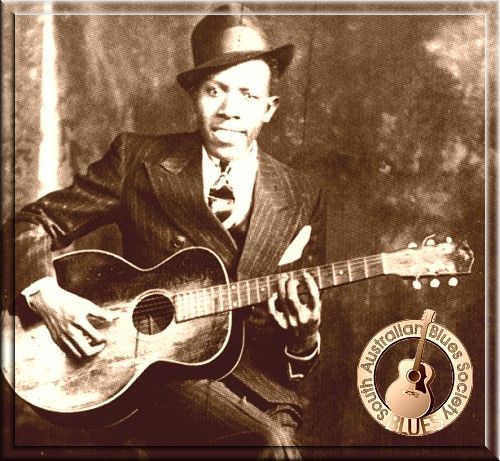South Australian Blues Society
(It's the old 1999 website I have dragged out of the archives for you to have a look at!)
Searching for Robert Johnson
The life and legend of the ‘King of the Delta Blues Singers.’
Guralnick, Peter. London: Pimlico, 1998.
The interesting thing about Robert Johnson is that his music has been a major source for especially British rock bands since the 1960s, and in the nineties his music is both more available and more popular than ever, and very little is actually known about this person, other than recordings of 29 songs, a couple of photographs and the tales of old blues musicians. More recently historians have picked over the records and are able to offer a few factual details. But, in the end, it has been the tales of blues musicians that have become the important source, because they give Robert Johnson a kind of mythical status. If I tell you the story of Robert Johnson, you will see what I mean.

The story Son House told is that on Saturday nights in the heart of the Mississippi delta there would be a young boy standing around the dances. ‘He blew the harmonica and he was pretty good at that, but he wanted to play a guitar.’ (p. 15) If the instruments were left unattended, this boy – Robert Johnson – would pick up one of the guitars and try to play it. He would make a frightful din and people would complain. ‘Why don’t y’all go in and get that guitar away from that boy? He’s running people crazy with it.’ (p. 15)
You will have to decide for yourself where the truth ends in the next part of the story. According to Son House, suddenly Robert Johnson went from someone who made a dreadful noise with the guitar to a musician who stood out from his peers. He attributed the sudden transformation to a pact with the devil. According to the story, Johnson met a stranger who told him that if he wanted to play the guitar he should take his instrument down to the crossroads at midnight. When he did this, a man approached him, took his guitar and tuned, played a song and handed it back to him. With that, Johnson could understand the guitar and play anything he wanted.
Apparently a certain LeDell Johnson claims that the events I have just recounted happened to her brother, Tommy, also a blues musician. This doesn’t strike me as further evidence that there is a guitar teacher out there somewhere roaming the crossroads so much as it suggests that the tale is a bit of a myth.
After this supposed event, Johnson became a travelling musician, roaming through the Mississippi delta and as far afield as St. Louis, Chicago, Detroit and New York. Sometimes he would work on his own and sometimes with other musicians. When he played with other musicians, it is said that he was secretive about his techniques and would play with his back to them.
Johnson lived off women during his travels. He chose plain and homely women, finding them much more faithful and attentive to his needs. If he sounds to you to be a rather unpleasant chap, that is how others found him as well, and one night one of these people poisoned him.
This part of the story takes on mythical proportions as well. According to Sonny Boy Williamson, he was with Johnson on this occasion. His companion was behaving in a reckless and provocative manner, according to Williamson. When he took an opened bottle of whisky from someone, Williamson knocked it from his hand, but that he took another one and drank it. Shortly after, he was in too much pain to continue playing. I won’t bother to describe the various accounts of this part of the tale. You can guess the rest.
It is difficult to say how much of this story you should believe but, in a way, that doesn’t matter because it’s really a story about blues music in general – or probably even about music in general. All musicians will probably admit that they have had to sell their souls and at least sometimes they’ll doubt that they struck much of a bargain.
If you like these kinds of stories interspersed with facts and anecdotes, and chronologically arranged, get hold of Peter Guralnick’s book on Robert Johnson. Johnson is a difficult topic for a book because so little is actually known about him and Guralnick does about as much as can be done with the material available. There is a section on the musical analysis of Johnson’s recordings but this is the weakest and least convincing part of the book, in my view.
Book Review by ET
